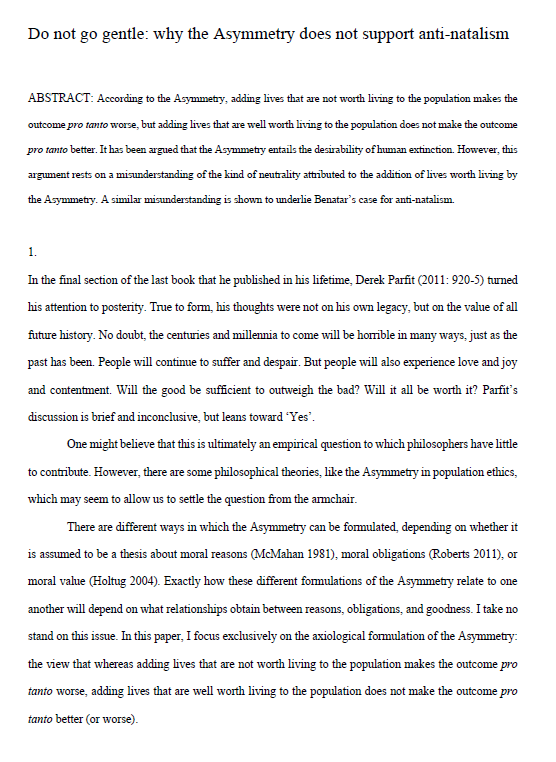Do not go gentle: why the Asymmetry does not support anti-natalism
Andreas Mogensen (Global Priorities Institute, Oxford University)
GPI Working Paper No. 3-2021
According to the Asymmetry, adding lives that are not worth living to the population makes the outcome pro tanto worse, but adding lives that are well worth living to the population does not make the outcome pro tanto better. It has been argued that the Asymmetry entails the desirability of human extinction. However, this argument rests on a misunderstanding of the kind of neutrality attributed to the addition of lives worth living by the Asymmetry. A similar misunderstanding is shown to underlie Benatar’s case for anti-natalism.
Other working papers
The evidentialist’s wager – William MacAskill, Aron Vallinder (Global Priorities Institute, Oxford University) Caspar Österheld (Duke University), Carl Shulman (Future of Humanity Institute, Oxford University), Johannes Treutlein (TU Berlin)
Suppose that an altruistic and morally motivated agent who is uncertain between evidential decision theory (EDT) and causal decision theory (CDT) finds herself in a situation in which the two theories give conflicting verdicts. We argue that even if she has significantly higher credence in CDT, she should nevertheless act …
Longtermism, aggregation, and catastrophic risk – Emma J. Curran (University of Cambridge)
Advocates of longtermism point out that interventions which focus on improving the prospects of people in the very far future will, in expectation, bring about a significant amount of good. Indeed, in expectation, such long-term interventions bring about far more good than their short-term counterparts. As such, longtermists claim we have compelling moral reason to prefer long-term interventions. …
How much should governments pay to prevent catastrophes? Longtermism’s limited role – Carl Shulman (Advisor, Open Philanthropy) and Elliott Thornley (Global Priorities Institute, University of Oxford)
Longtermists have argued that humanity should significantly increase its efforts to prevent catastrophes like nuclear wars, pandemics, and AI disasters. But one prominent longtermist argument overshoots this conclusion: the argument also implies that humanity should reduce the risk of existential catastrophe even at extreme cost to the present generation. This overshoot means that democratic governments cannot use the longtermist argument to guide their catastrophe policy. …

